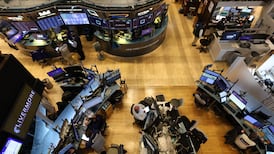The yen weakened as China’s central bank strengthened the yuan’s fixing by the most in four months, spurring demand for higher-yielding assets at the expense of those viewed as havens.
Japan’s currency dropped against 30 of its 31 major peers. It slid most against the currencies of commodity-producing nations that tend to benefit from a strong Chinese economy, with a Bloomberg gauge of raw-material prices climbing to a three- month high.
Australia and Canada's dollars benefited alongside the ruble and rand. The euro weakened as investors weighed the impact of an extension of stimulus on Thursday by the European Central Bank.
“The overall FX mood is likely to shift back to risk on,” Kit Juckes, global strategist at Societe Generale SA in London, wrote in an e-mailed report. The yen “is now heading all the way back to 120.”
The yen depreciated 0.6 per cent to 113.82 per dollar at 9.55 am London time. It was little changed versus the euro and headed for its biggest weekly loss since January 29th.
It dropped most against the currencies of Russia and South Africa, both major commodity exporters.
Versus the dollar, the ruble surged 1.8 per cent and South Africa’s rand jumped 1 per cent. The Aussie gained 0.5 per cent to 74.90 US cents.
The loonie appreciated 0.8 per cent to C$1.3243 per US dollar, set for an eighth weekly gain, the longest stretch since November 2007. The Bloomberg Commodity Index rose 0.6 per cent and touched its highest level since December 9th.
The yuan reference rate became one of the most closely scrutinized indicators at the start of this year when a series of weaker fixings raised concern about the state of the world’s second-largest economy.
That fuelled the yen’s biggest monthly rally versus the dollar since 2008 in February. The euro depreciated 0.5 per cent to $1.1117, though it’s still headed for its best week since February 5th.
The single currency jumped 1.6 per cent on Thursday as ECB president Mario Draghi’s comments after a policy meeting fuelled speculation he has finished cutting interest rates.
“The ECB delivered a full stimulus line-up, yet Draghi’s comments undermined it,” said Jun Kato, a senior fund manager at Shinkin Asset Management in Tokyo.
“Markets are seeing a limit to monetary easing, that there’s so much that can be done by cutting rates when appetite for borrowing cash is weak.”










